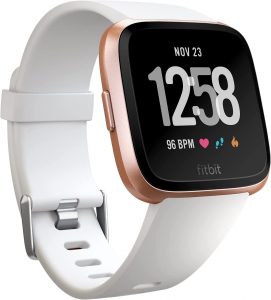Losing weight can be a challenging process, and it’s not always easy to know if you’re making progress. That’s where fitness trackers come in. These devices provide you with valuable insights into your physical activity levels and can help you track your progress over time. By monitoring metrics like steps taken, calories burned, and heart rate, fitness trackers allow you to set goals and measure your progress towards them.
But fitness trackers aren’t just useful for tracking your progress – they can also provide motivation and encouragement to stay active. Many fitness trackers come with built-in challenges and social features that allow you to compete with friends and family, providing a sense of accountability and motivation to keep going.
There are a variety of fitness tracker brands on the market, each with their own unique features and benefits. Some of the most popular brands include Fitbit, Garmin, Apple Watch, and Samsung Galaxy Watch. These devices range in price, features, and compatibility with other apps and devices.
If you’re new to fitness tracking, choosing the right device can be overwhelming. However, by understanding the differences between brands and considering your own fitness goals and needs, you can make an informed decision that will help you achieve your weight loss goals.

Fitbit
- Comprehensive tracking
- User-friendly app allowing you to sync your data across platforms
- Range of devices
- Social features
- Integration with other apps

Apple Watch
- Health and fitness tracking
- Seamless integration with other Apple devices:
- Stylish design:
- App ecosystem
- Siri integration:

Galaxy Watch
- Health and fitness tracking
- Long battery life
- Stylish design
- Compatibility with non-Samsung devices
- App ecosystem
 Fitbit
Fitbit
A Fitbit tracker plays a vital role in monitoring and fine-tuning your fitness journey. It provides a comprehensive overview of your health and helps you make informed decisions about your lifestyle. By wearing a Fitbit tracker, you can effortlessly track various aspects of your well-being, including exercise, water intake, sleep patterns, and even glucose levels. This holistic approach empowers you to take control of your fitness and make positive changes to improve your overall health.
One of the key advantages of a Fitbit tracker is its ability to seamlessly integrate with other apps and devices. Fitbit offers compatibility with a wide range of health and fitness applications, allowing you to consolidate your data in one place for a more comprehensive analysis. By syncing your Fitbit tracker with other apps, such as nutrition trackers or workout apps, you can gain deeper insights into your fitness progress, set personalized goals, and receive tailored recommendations to optimize your workouts and daily routines.
Tracking your fitness journey goes beyond just counting steps or monitoring heart rate. With a Fitbit tracker, you have access to a wealth of data that enables you to make evidence-based decisions. By monitoring exercise patterns, you can identify areas for improvement and adjust your workouts accordingly. Tracking water intake helps you stay hydrated and maintain optimal performance levels. Monitoring sleep patterns provides insights into the quality of your rest, enabling you to make adjustments to promote better sleep habits. Additionally, tracking glucose levels allows individuals with diabetes or those concerned about their blood sugar levels to gain valuable insights into their overall health and make informed choices to manage their condition.
In conclusion, a Fitbit tracker serves as a valuable companion in your fitness journey, allowing you to monitor and fine-tune various aspects of your well-being. With its integration capabilities, you can consolidate data from multiple sources and gain a comprehensive understanding of your progress. By leveraging the insights provided by a Fitbit tracker, you can optimize your exercise routine, improve hydration and sleep habits, and make informed decisions to support your overall health and wellness.
